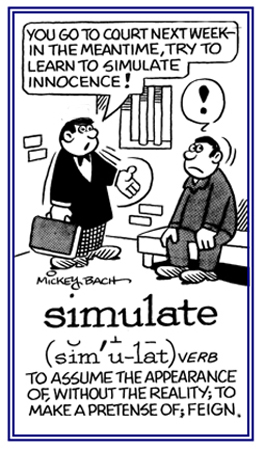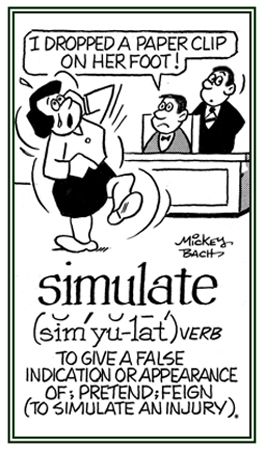You searched for:
“simulate”
assimilate, simulate
assimilate (uh SIM uh layt") (verb)
1. To consume and incorporate (nutrients) into the body after digestion: What Bob eats will assimilate into his bodily system.
2. To learn something so that it is fully understood and can be used: Children need to assimilate new ideas and there is a lot of information to assimilate in schools.
3. To cause a person or group to become part of a different society, country, etc.: Schools have been used to assimilate the children of immigrants.
2. To learn something so that it is fully understood and can be used: Children need to assimilate new ideas and there is a lot of information to assimilate in schools.
3. To cause a person or group to become part of a different society, country, etc.: Schools have been used to assimilate the children of immigrants.
simulate (SIM yuh layt") (verb)
1. To make a pretense of; to feign: Lue tried to simulate tears to get the sympathy of her friend.
2. To have or to take on the appearance, form, or sound of: The wall surface was constructed to simulate stone.
2. To have or to take on the appearance, form, or sound of: The wall surface was constructed to simulate stone.
The contractors understood Jordan's request to simulate brick when building the new house; however, it took the workers time to assimilate the instructions of exactly what Jordan was actually expecting.
This entry is located in the following unit:
Confusing Words Clarified: Group A; Homonyms, Homophones, Homographs, Synonyms, Polysemes, etc.
(page 8)
simulate (verb), simulates; simulated, simulating
1. To reproduce the essential features of something; such as, an aid to study or training: To practice for their drivers’ exams, students were using a computer to simulate various driving conditions and situations.
2. To feign, fake, or to pretend to experience something: Margie simulates pleasure even when someone disturbs her.
3. To mimic or to imitate someone or something: There are some homeowners who use devices that simulate the sounds of barking dogs in order to keep intruders away from their houses.
4. To create a representation or a model of a physical system or some particular action: Margaret bought a coat that simulatesthe the look and feel of real fur.

© ALL rights are reserved.

© ALL rights are reserved.
Go to this Word A Day Revisited Index
2. To feign, fake, or to pretend to experience something: Margie simulates pleasure even when someone disturbs her.
3. To mimic or to imitate someone or something: There are some homeowners who use devices that simulate the sounds of barking dogs in order to keep intruders away from their houses.
4. To create a representation or a model of a physical system or some particular action: Margaret bought a coat that simulatesthe the look and feel of real fur.
Tom's neighbor has a wooden wall that simulates the appearance of stone.
5. Etymology: from Latin simulatus, past participle of simulare "to make like, to imitate, to copy" from the stem of similis, "like, resembling, of the same kind".

Go to this Word A Day Revisited Index
so you can see more of Mickey Bach's cartoons.
This entry is located in the following unit:
simal-, simil-, simul-, -semble
(page 4)
simulate, stimulate
simulate (SIM yuh layt") (verb)
To copy or to imitate, often in such a manner as to be deceptive: "The students practiced flying a machine that was designed to simulate the actual flight of a jet."
"The jeweler agreed to simulate the antique necklace so the original could be kept in safe storage."
stimulate (STIM yuh layt") (verb)
To arouse, to excite, or to provoke. "The professor was exceptional and could stimulate her students to an active discussion of the issues."
"A salary raise for employees could very well stimulate more production for the company."
It might stimulate more learning if someone could design a game to simulate the peaceful uses of space ships.
This entry is located in the following unit:
Confusing Words Clarified: Group S; Homonyms, Homophones, Homographs, Synonyms, Polysemes, etc. +
(page 5)
A unit related to:
“simulate”
(Greek: represent, impersonate, copy; imitate, act as; simulate, simulation)
